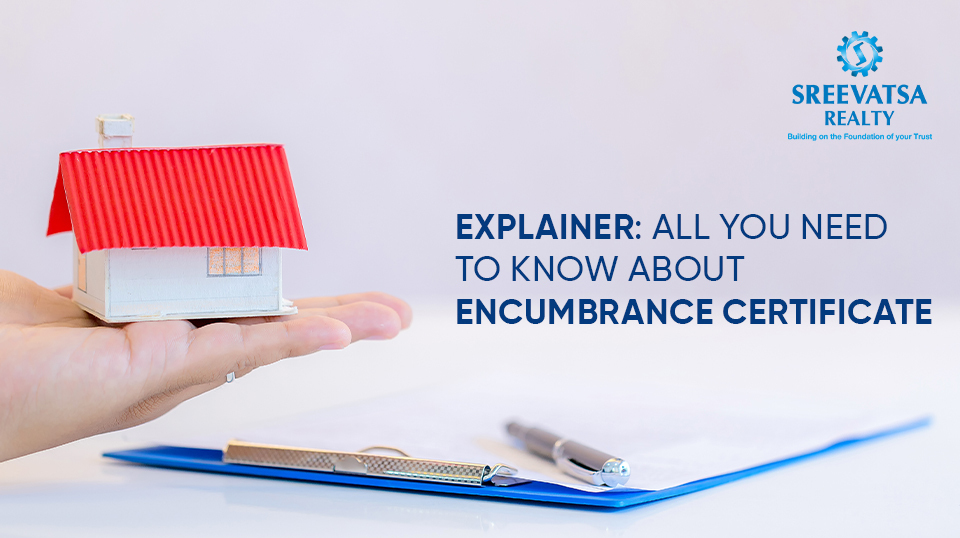Explainer: All You Need To Know About Encumbrance Certificate
If you are planning to buy a house property, you must have come across the ‘Encumbrance Certificate (EC)’. While preparing for the big purchase by bringing together all required documents, make sure you don’t miss out on an Encumbrance Certificate of the specific property.
What is an Encumbrance Certificate?
An encumbrance refers to any charge created on any asset, more often used in the context of real estate. An Encumbrance Certificate or EC is a certificate of assurance that the property in question is free from any legal or monetary liability such as a mortgage or an uncleared loan.
It is of capital importance that a home-buyer obtains an EC not only to secure his legal title over the property but also to be eligible to obtain loans from most banks and financial institutions for or against the property.
There are two types of ECs. They are:
- Form 15
- Form 16
The sub-registrar’s office issues an EC on Form 15 if a property has any encumbrances during the period for which the applicant has sought a certificate. While a nil-encumbrance certificate is issued on Form 16 by the same office if a property has not registered any encumbrances during the period for which the applicant has sought a certificate.
What is a Nil Encumbrance Certificate?
When you apply for an EC, you will be asked to specify the period for which you need the information
If there are no charges placed on the property during the requested period, a “Nil Encumbrance Certificate” will be issued. This means that no lender has placed a lien on the property during that period. The application fee to get an EC differs from state to state. It depends on the location of the property and the state government that governs it.
How to Apply for an EC Online
The steps to apply for an EC differs from one state to another. Some States allow users to apply for an EC online. If you cannot apply for an EC online in your State, you must visit the respective sub-registrar’s office.
Below is the procedure to apply for an EC online:
- Visit the respective State’s official land registration website and select the option to apply for an EC.
- Enter all the required fields on the application for EC window, then click save/update.
- Enter the search period for which you require the EC and then click on ‘Calculate Fee’.
- Upon paying the required application fee is paid and is filed, you’ll be directed to the ‘Acknowledgment’ window. Click ‘View Acknowledgement’ and you’ll be able to take a print of the acknowledgement.
- An inspection will be carried out by an inspector from the land records department and check for all information of the said property for a period.
- Post the completion of the inspection, an EC will be issued will all transactions occurred during the specified period. If there were no transaction during the period, then a nil EC will be issued.
Which States Issue Online ECs?
ECs are primarily granted physically throughout India, with the exception of a few states. Andhra Pradesh, Odisha, Kerala, Puducherry, Tamil Nadu, and Telangana are among the states that provide ECs online.
How to Apply for EC Offline
- Visit the respective sub-registrar’s office (the jurisdiction depends on the location of the property).
- Submit the duly filled Form 22.
- You will be required to enter details such as the names of the seller and buyer, property details, the type of document you are requesting for (in this case, EC), etc.
- Pay the required fee at the counter.
- Once your application is successfully submitted, you will get a reference/acknowledgement number. You can use this number to track the status of the application online.
How to Track EC Status
The steps to track the status of your EC application differs from one website to another. Most of the government websites that allow you to apply for an EC online will also let you track the status of the application.
Most official websites of states allow users to check the status online. The steps are as follows:
- Choose “EC Status” under the “Encumbrance Certificate” option available under the “Certificate” menu.
- Enter the transaction ID provided to you when you submitted the application, enter the captcha, and click on “Check Status”.
- The certificate will be displayed on the screen and you will be able to download it in PDF format.
How Long Will It Take to Get an EC?
As mentioned earlier, the process to obtain an EC differs from one place to another. If you apply for an EC in person at a Sub-Registrar’s Office, you will get the certificate within 15 to 30 days. However, if you apply for an EC online, you will get it faster. Online applications usually take 2 to 3 working days to be processed.
How to Download EC for Your Property
As mentioned earlier, if the respective State Government website allows you to track the status of your EC application online, you will be able to download the file once it is generated.
Documents Required to Get an EC
Some of the documents you would need while applying for an EC are:
- Property details and its title deed details.
- The property sale deed/gift deed/partition deed/release deed if a deed has been executed previously.
- The deed number upon registration containing the date and book number along with the signature of the applicant.
- Property registration document.
- Address proof of the applicant.
Please visit the nearest sub-registrar’s office to know more about the EC in your town/city.





